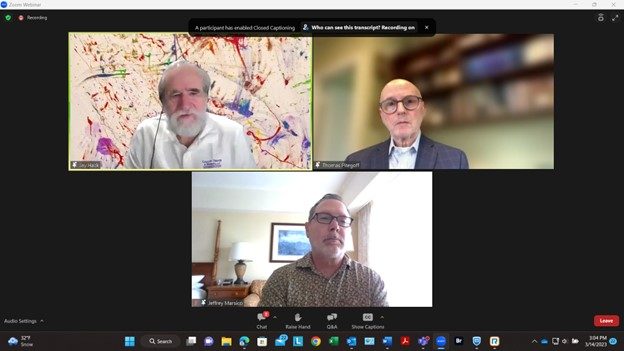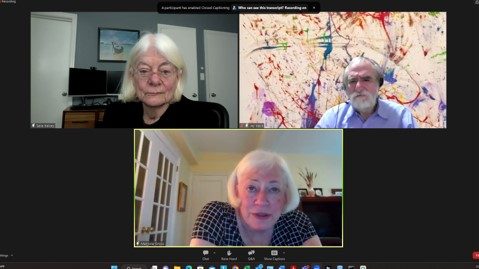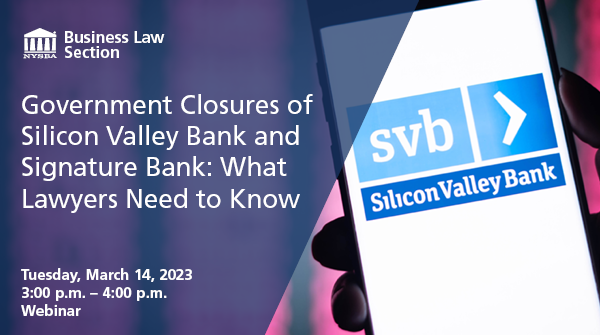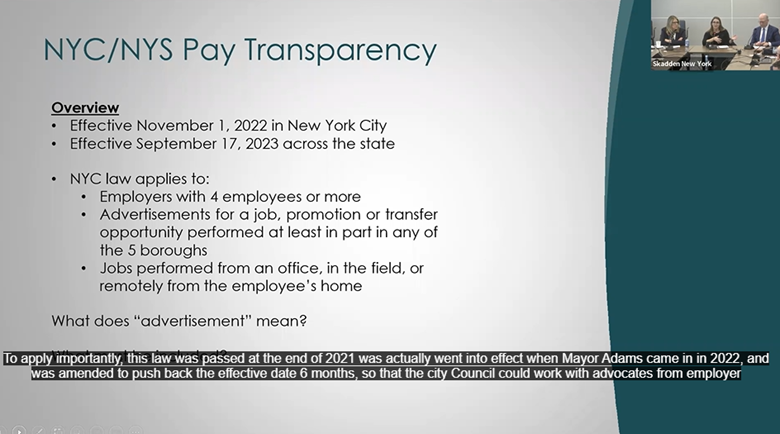Calm Is the Best Antidote: Ten Questions About the Failures of Silicon Valley, Signature Banks
3.15.2023

Banking is an industry built on trust and the worst thing that can happen is the kind of customer panic that led up to the takeover of Silicon Valley Bank and has taken hold of investors since.
Jeff Marsico, president of The Kafafian Group, who spoke Tuesday at a New York State Bar Association webinar on the failure of Silicon Valley and New York’s Signature Bank, appeared from Hawaii where community banks were meeting at a major conference. He said there was no reason for panic and that the bank managers gathered at the meeting had very few inquiries from panicked customers. But, nevertheless, bank stocks continued to plummet on Wednesday.
“Banking is a trust and confidence business and when depositors lose confidence, it’s almost like the bank run scene out of ‘It’s a Wonderful Life’,” Marsico said. “Banks don’t keep their money in a vault; they’re lending it to someone else. So large-scale withdrawals would be difficult for any bank to withstand, especially concerning the request for withdrawals of Silicon Valley Bank as a percent of their total deposits.”
Jay Hack, partner at Gallett Dreyer & Berkey, and Marsico spoke to nearly 800 people attending a NYSBA webinar on a myriad of issues surrounding what has been described as the largest bank failure since the global financial crisis a 15 years ago. They elaborated on the federal government’s actions that resulted in paying depositors in full beyond the federally insured $250,000 ceiling.
This financial emergency was not an isolated incident.
Banks have, of course, failed in the past, most notably during the 2008 financial crisis, but Silicon Valley’s closure brought the industry and government into uncharted waters. The bank had a concentration of wealthy customers engaged in the technology field who had social media accounts with 100,000-plus followers. These customers took to social media, using it in a sophisticated way that increased uneasiness among the bank’s clientele.
Hack and Marsico spent nearly 45 minutes discussing the closures and another hour answering questions. Several of those inquiries along with others from a blog published by Hack are listed below. They have been edited for clarity.
Q&A
Q: Why is the FDIC stepping in and guaranteeing the repayment of all deposits at both Signature Bank and at Silicon Valley Bank, regardless of the amount?
A: Banks don’t keep buckets of cash lying around doing nothing, just waiting for customers to ask for their money back. Banks use the proceeds of deposits principally to make loans and to purchase other investments. If an extremely high percentage of depositors try to withdraw their money at once, the bank can’t make the withdrawal requests out of available cash. The FDIC’s actions are designed to avoid panic among depositors who rush to their banks to withdraw money, causing more panic and an ensuing downward spiral.
Q: Did we avert a disaster?
A: We faced a potentially very serious disaster, and the disaster was averted. The panic was averted because of what happened. Now, what did the government do? It lifted the insurance cap. It provided funds for the future.
Q: Why was the closure now?
A: The regulators came in on Sunday, a very unusual day for the regulators to close a financial institution. Both of these banks had a very significant portion of their deposit base above the FDIC limit. Silicon Valley bank might have been 94% and Signature might have been 90%. So the two failures were a crisis of confidence in the banking system, not as a quality driven. It was a crisis of confidence, and they had a classic run on the bank that almost no financial institution could have withstood.
Q: Are my spouse and I both insured if we have separate accounts and a joint account greater than $250,000 in the same bank?
A: The insurance rule is that they are insured by what are called ownership interests. So if you have an account, and your spouse has an account, and then you have a third account, the two of you own jointly, that’s three different ownership interests you have and you can get up to $750,000 worth of insurance provided that you spread the money correctly between the three different ownership interests.
Q: Is my money available if I am a Silicon Valley customer?
A: Yes and you can withdraw the money as of Monday and put it in another bank if you so choose. Then if you choose not to, chances are your deposit will probably be sold to one of the large financial institutions in the United States, so you could just sit tight because the government is standing behind those deposits.
Q: Am I going to be able to continue to use my ATM card or my credit card issued by Signature Bank. How about using the blank checks that I have? How about letters of credit issued by Signature Bank?
A: The answer appears to be yes to all of these questions, which the senior officers of Signature have confirmed.
Q: I don’t care about Signature Bank, but I have a lot of deposits at other banks, some of which exceed the insurance limits. Should I be worried?
A: So long as the Federal Reserve and the United States government do not go bankrupt, they will presumably continue to support the banking industry and make additional funds available to support deposit withdrawals. However, some knowledgeable commentators, including former regulators, think that support is unfairly biased in favor of the larger institutions, but only time will tell.
Q: So who is going to pay the costs of this?
A: We anticipate that no losses on the Silicon Valley Bank and Signature Bank closures will be borne by taxpayers. If there are losses, they will be paid through a special deposit insurance premium assessment on other banks. Remember that both banks that were closed had substantial assets in the form of performing loans. Signature Bank was certainly solvent, with total assets exceeding total liabilities, and we have reason to believe that discussions are underway to acquire Signature Bank at no government cost.
Q: Will the banks implode if people keep transferring money out?
A: No. The Federal Reserve has said it will dump more money into this if needed to fund deposits. If you want to be a good citizen, don’t panic.
Q: Where are we right now?
A: Again, banking is a trust system. The government’s actions combined with bankers’ direct communication with their customers ensured the contagion didn’t spread throughout the system.
Tom Pitegoff, chair of NYSBA’s Business Law Section and principal at Offit Kurman, moderated the panel. Go here to access the full webinar.






